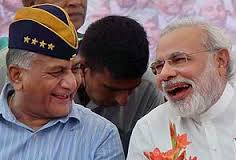
As media reports quoted an army inquiry on Gen. Singh misusing secret funds to destablise the Jammu and Kashmir government among others, the defence ministry, which was initially reticent on the matter, came out with a terse four-para statement.
Predictably, a slugfest ensued between the Congress and the BJP on the issue, with the main opposition party terming it political vendetta and the Congress denying this. The Left chose to stay silent.
In its statement, the defence minister said : "The government has received a report from the Army HQ on certain issues relating to one of its outfits as reported by a section of the media today."
"The report impinges on matters of national security and, as such, the government will take a decision and further actions after a careful examination of the report." the statement said, adding: "The government has in place measures to prevent any such undesirable activities."
The statement also clarified that the ministry "has not taken any decision for a CBI inquiry into the issues raised in the army's report".
The media report was based on a inquiry by a board of officers into the functioning of the Technical Services Division (TSD) of the Corps of Military Intelligence during General Singh's tenure.
The report had called for bringing the TDS under the Central Bureau of Investigation scanner, the media report added.
According to the newspaper report, Gen. Singh had also paid off an NGO to try and change the line of succession in the army top brass.
On their part, people close to Gen. Singh said he was exploring the legal route on this issue.
Lt. General (retd.) Raj Kadiyan termed the issue as "personal vendetta" against the former army chief.
Speaking for reporters, Information and Broadcasting Minister Manish Tewari said reports of misuse of secret service funds by Gen. Singh, are "under the active consideration of the government" and appropriate action would be initiated against the guilty.
"If at all any maleficence is found against any serving or retired officers, appropriate action would be initiated by the government," he said.
BJP spokesperson Nirmala Sitharaman said: "He is being hounded because he was seen seated beside Narendra Modi at the Rewari rally."
"The Congress has been misusing CBI and setting wrong precedents. There is already trust deficit and it should stop using hounding tactics," she said.
Added BJP leader Balbir Punj: "It is not on the merit of the issue that the government is trying to initiate a CBI probe against retired Gen V.K. Singh. It is clearly a fallout of his going and sharing the dais with Narendra Modi and hailing him as a leader."
General V.K. Singh had participated in an ex-servicemen's rally addressed by the BJP's prime ministerial nominee, Gujarat Chief Minister Narendra Modi, Sep 15 in Rewari in Haryana.
But the Congress denied the BJP's charge.
"He has not been arrested, nothing has happened, only Lt. Gen. Vinod Bhatia has submitted a report, and said there should be a probe by an agency like Central Bureau of Investigation (CBI). The government has not decided anything nor taken any steps," Congress leader Rashid Alvi said.
"It is not possible that if a person belongs to the opposition party or has ties with a leader who has been declared as the prime ministerial candidate, action should not be taken against him. Law will take its own course," he said.
The Left chose not to link the report and the politics over it, saying it was a national security issue.
Communist Party of India leader Gurudas Dasgupta said: "I would not link it with any political development. The issue is more important because it concerns the defence and security of the country."
He, however, questioned the delay in taking action, on the part of the government.






Comments
Add new comment